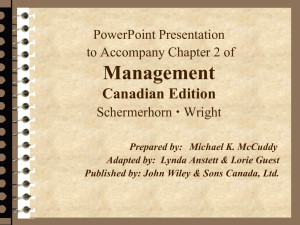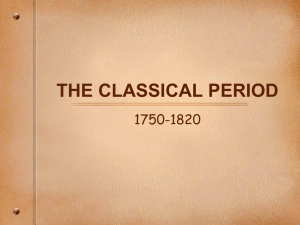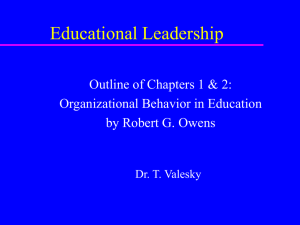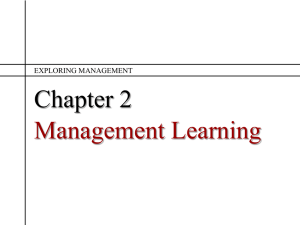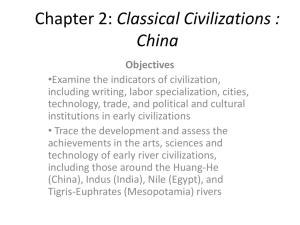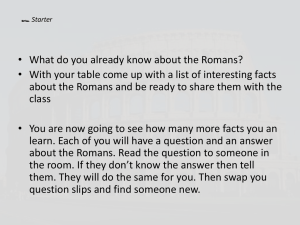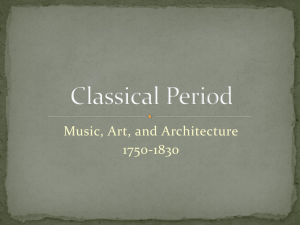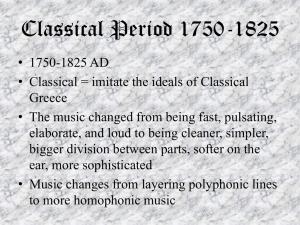Foundations of Management
advertisement
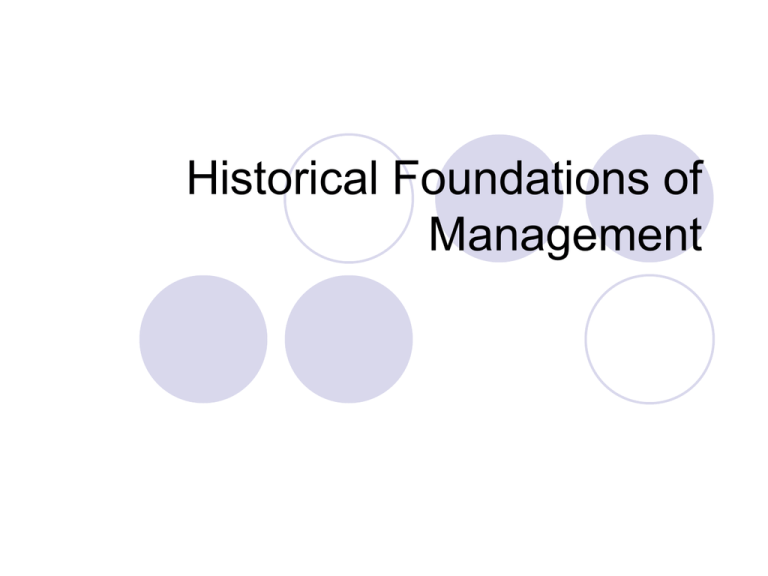
Historical Foundations of Management Classical Approaches Assumption: People are Rational Scientific Management Administrative Principles Frederick Taylor Frank & Lillian Gilbreth Henry Fayol Mary Parker Follett Bureaucratic Organization Max Weber Classical Approaches to Management Scientific Management - Frederick Taylor Develop for every job: rules of motion, standardized work implements, proper working conditions Carefully select workers with the right abilities for the job Carefully train workers to do the job and give proper incentives Support workers by carefully planning their work Motion Studies are a management tool that allows for a task to be broken down into smaller parts (motions) UPS use motion standards to time their sorters in order to insure that vans are packed in the shortest time possible Classical Approaches to Management Administrative Principles Henri Fayol believed management could be taught, and so he developed his managerial guide foresight - complete plan of action for future organization - provide resources to implement plan command - lead, select, evaluate workers to get the best work coordination - fit diverse efforts together control - make sure things happen according to plan Classical Approaches to Management Administrative Principles Mary Parker Follett Groups are mechanisms through which individuals can combine their talents for a greater good She viewed organizations as “communities” Manager’s job is to help others in organizations cooperate and achieve an integration of interests All workers should be made to feel like an owner of the company Classical Approaches to Management Bureaucratic Organization - Max Weber Bureaucracy ideal, intentionally rational and very efficient form of organization based on principles of logic, order and legitimate authority Exercise – “Why it Pays to be a Jerk” Classical Approaches to Management Bureaucratic Organization Defining characteristics Clear division of labor • Jobs are well defined and workers are highly skilled Clear hierarchy of authority Formal rules and procedures Impersonality • No preferential treatment; all rules are uniformly applied Careers based on merit Classical Approaches to Management Bureaucracy Today the term is often associated with a negative connotation associated with possible disadvantages of bureaucracy are excessive paperwork or “red tape” Slowness in handling problems Rigid and often resistant to change Employee apathy Behaviourial Approaches to Management Human Resource Approaches to Management Assumption: People are Social and Self-actualizing Hawthorne Studies Theory of Human Needs Elton Mayo Abraham Maslow Theory X and Theory Y Personality & Organization Douglas McGregor Chris Argyris Classical Approaches to Management Hawthorne Studies initial study to examine the relationship of economic incentives and physical conditions on worker output relationship was not supported “psychological factors” interfered with experiment Relay Assembly Test-Room Studies designed to minimize the “psychological factors” of previous experiment factors that accounted for increased productivity • group atmosphere • participative supervision Classical Approaches to Management Hawthorne Studies Employee Attitudes, Interpersonal Relations and Group Processes Findings in final study • people will restrict output to avoid displeasure from the group • Groups can have strong negative, as well as positive, influences on individual productivity Classical Approaches to Management Hawthorne Studies Lessons Shift toward social and human concerns as keys to productivity Hawthorne effect • people who are singled out for special attention perform as expected Classical Approaches to Management Human Relations Movement managers who use good human relations will achieve productivity The insights of the human relations movement set the stage for what is now evolved as the field of organizational behaviour Classical Approaches to Management Human Relations Movement Maslow’s Theory of Human Needs need is a physiological or psychological deficiency a person feels the compulsion to satisfy deficit principle • satisfied need is not a motivator of behavior progression principle • a need becomes a motivator once the need below it is satisfied Classical Approaches to Management Human Relations Movement Maslow’s Theory of Human Needs Physiological • Most basic of all human needs; necessities Safety • Need for security, protection, and stability Social • Need for love, affection, sense of belongingness Esteem • In the eyes of others; respect; mastery; competence Self-actualization • Self-fulfillment; to grow and be creative; use abilities to fullest extent Classical Approaches to Management McGregor’s Theory X and Theory Y According to Theory X, managers believe workers dislike work lack ambition are irresponsible are resistant to change prefer to be led Classical Approaches to Management McGregor’s Theory X and Theory Y According to Theory Y, managers believe workers are willing to work are capable of self control accept responsibility are imaginative and creative self-directed Classical Approaches to Management McGregor’s Theory X and Theory Y Managers create self-fulfilling prophesies That is, through their behaviour they create situations where subordinates act in ways that confirm the original expectations Theory X managers create dependent and reluctant workers Theory Y managers create workers who perform as expected with initiative and high performance central to notions of empowerment Exercise – Richest CEO’s Classical Approaches to Management Argyris’ Theory of Personality and Organization management practices in traditional hierarchical organizations are inconsistent with mature adult personalities Managers who treat people positively and like responsible adults will achieve more productivity Exercise – What Would the Classics Say? Consider the following… Six months after being hired, Bob, a lab worker, is performing just well enough to avoid being fired. He was carefully chosen and had the abilities required to do the job well. At first Bob was enthusiastic about his new job, but now he isn’t performing up to this potential. Fran, his supervisor, is concerned and wonders what can be done to improve this situation. Assume the identity of one of the philosophers discussed in the unit so far. Fran has asked you for advice of the management situation describe. Answer the following questions as you think your assumed identity would respond. Be prepared to share your results with the class. Exercise – What Would the Classics Say? 1. What are your basic beliefs about good management and organizational practices? 2. What do you perceive may be wrong in this situation that would account for Bob’s low performance? 3. What could be done to improve Bob’s future job performance? Modern Approaches to Management Systems Thinking System collection of interrelated parts that function together to achieve a common purpose Subsystem smaller component of a larger system Open systems organizations that interact with their environments in the continual process of transforming resource inputs into outputs Organizational Network of Subsystems Purchasing & Inventory Systems Inputs Suppliers Marketing, sales, & Distribution Systems Outputs Operations & Service Management Systems Accounting & Financial Systems Customers Information & Technology Systems Modern Approaches to Management Systems Thinking external environment source of both resources and customer feedback impact on operations and outcomes boundary spanners departments whose functions include working with outsiders and staying informed about external environmental developments Modern Approaches to Management Contingency Thinking match managerial responses with opportunities unique to different situations no longer “one best way” to manage Summative Case Study – Hewlett Packard Trends and Directions Global Awareness pressure for quality and performance excellence is created by a highly competitive global economy Self Assessment Complete the self assessment A 21st Century Manager? This survey will provide a profile of your management foundations (PMF). Before calculating what your score is, ask someone to predict the outcome.

